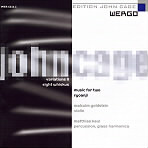Wergo’s formidable Edition John Cage continues its survey with later pieces featuring violinist Malcolm Goldstein, who worked with the composer on several of them. The score for Variations II consists of transparent sheets inscribed with points and lines. If anyone can manage to transform points and lines into sound, it’s Goldstein and percussionist Matthias Kaul, who actually make sense of these cryptic works. Their choice of violin and glass harmonica for Variations II’s instrumentation gives it a lovely prismatic quality. Ryoanji exists in several versions; Goldstein and Kaul perform the one for voice and percussion, choosing distinct violin timbres and articulations for each phoneme of text. The result has the stylized courtliness of kabuki. For his 1984 Eight Whiskus, Cage assigned the syllables of a Chris Mann poem to notes of the F minor scale using chance procedures. A year later, he worked out a solo violin version with Goldstein in which vowels and consonants are transformed into various bowing positions and gradations of bowing pressure. For some, the slowly varying pressure of bow on string will resemble nothing so much as fingernails scratched against a blackboard. But Cage enthusiasts will be impressed with Goldstein’s sensitivity and control. Music for Two also gets a magnificent performance.
































